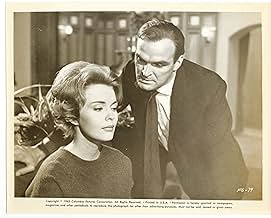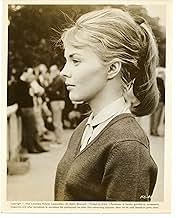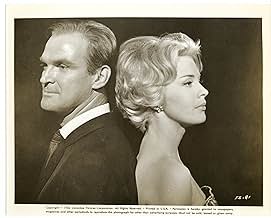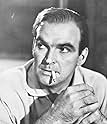A young American art student must decide whether to stay in Paris with her boyfriend or go back to the U.S. when her wealthy father arrives to bring her back.A young American art student must decide whether to stay in Paris with her boyfriend or go back to the U.S. when her wealthy father arrives to bring her back.A young American art student must decide whether to stay in Paris with her boyfriend or go back to the U.S. when her wealthy father arrives to bring her back.
Barbara Sommers
- Madame Piguet
- (as Barbara Somers)
James Leo Herlihy
- Dr. John Haislip
- (as James Herlihy)
Claudine Auger
- Clio Andropolous
- (uncredited)
Jacques Charon
- Patrini
- (uncredited)
Michel Wyn
- Man with dark glasses in the bar
- (uncredited)
Featured reviews
The film opens with art student Christina (Jean Seberg) walking in Paris, then trying to paint what seems to be a self-portrait, but it's not coming out right. She looks and acts like "Gidget", as she flirts with "Guy"(Phillippe Forquet), who is dashing and opinionated. We watch as the poor-little-rich-girl from Chicago figures out how to survive another six months before the money runs out. There are long periods where we only hear only music, or just silence as she looks at paintings done by others. Guy has some secrets, but we don't find out what they are until about halfway through the story. Then we flash forward to see how everyone is doing now. Directed by Robert Parrish, who had won an Oscar for directing "All the Kings Men". Film moves pretty slowly. The most amusing part of this film is in the credits where we learn that the bistro owner is played by "Moustache". Skip it. Too slow, too serious. Not sure what it wants to be. Will she ever find the perfect man? A more interesting tale is the real life story of Phillippe Forquet - was engaged to Sharon Tate at one point, married Linda Morand.
Robert Parrish did far more work as editor than as director - in fact, IN THE FRENCH STYLE became one of his rare forays into that film-making department. Despite that, he did a commendable job of orchestrating a large number of characters, all of whom emerge as necessary for the piecing together of this tale of human love driven by innocence, learning past innocence, and ultimately convenience.
To that end Parrish is greatly helped by superior performances from his entire cast, down to the minor parts. Jean Seberg as Christina James shines as as the cherry on this delicious cake, not because of the much-repeated and to me needless fact that she is an American residing in Paris but because she is a woman, the universal femme par excellence.
She begins by developing an adolescent relationship with Guy (Philippe Fouquet), who tries to act older than his age, and even warns her that Frenchmen slap back, ultimately correctly predicting that she will in time have many men in her life and ultimately settle with one for economic and social convenience.
As she moves away from the underage Fouquet after the film's first 45 minutes, and gets acquainted with a bunch of handsome and variously interesting men, she has a memorable re-encounter with her father, whom she has not met in four years, and comes to see her in Paris. Addinson Powell, an actor I know nothing about, delivers a short, simple and naturalistic performance as the inevitably interested Dad, who rapidly surmises the pedantic and flash in the pan 1960s scene, and warns his daughter that she may be wasting her time extending her stay in Paris.
In a memorable sequence, Dad sees Christina join a group of models in assorted clothing on a stage for a group photo, and is in fact congratulated on his remarkably scultpural facial features, all of which convince him of un-reality.
Besides tapping so subtly and yet incisively into the 1960s scene, IN THE FRENCH STYLE posts several touches of genius, including never showing the Eiffel Tower although the whole shoot occurs in Paris; and, especially, Stanley Baker making his entrance 50 minutes into the film.
Baker may not be the most handsome of male leads, but as a strapping fellow with penetrating eyes he spots Seberg and they immediately attract to each other. The problem, if they would call it that in the beginning, is that each has other partner exploits on the go. Eventually, Seberg tires of bidding farewell at airports knowing that he will be sharing his bed with other women abroad.
Finally, she picks a man she obviously does not love as much as Baker but one who is a US-based medical doctor and, at the very least, banks a reliable income and enjoys solid social standing. And, of course, she will be returning to her roots outside of heathenish and hedonistic Paris where her physical beauty and social mobility may soon start losing sheen.
The instrumental score by Joseph Kosma deserves the highest plaudits, as does immaculate cinematography by Michel Kelber. Irwin Shaw's book and screenplay are absolute top drawer, too.
Deeply observed must-see film, to me more modern than most of this computer-brained trash we see today that passes for love stories. Or any other stories, for that matter. 10/10.
To that end Parrish is greatly helped by superior performances from his entire cast, down to the minor parts. Jean Seberg as Christina James shines as as the cherry on this delicious cake, not because of the much-repeated and to me needless fact that she is an American residing in Paris but because she is a woman, the universal femme par excellence.
She begins by developing an adolescent relationship with Guy (Philippe Fouquet), who tries to act older than his age, and even warns her that Frenchmen slap back, ultimately correctly predicting that she will in time have many men in her life and ultimately settle with one for economic and social convenience.
As she moves away from the underage Fouquet after the film's first 45 minutes, and gets acquainted with a bunch of handsome and variously interesting men, she has a memorable re-encounter with her father, whom she has not met in four years, and comes to see her in Paris. Addinson Powell, an actor I know nothing about, delivers a short, simple and naturalistic performance as the inevitably interested Dad, who rapidly surmises the pedantic and flash in the pan 1960s scene, and warns his daughter that she may be wasting her time extending her stay in Paris.
In a memorable sequence, Dad sees Christina join a group of models in assorted clothing on a stage for a group photo, and is in fact congratulated on his remarkably scultpural facial features, all of which convince him of un-reality.
Besides tapping so subtly and yet incisively into the 1960s scene, IN THE FRENCH STYLE posts several touches of genius, including never showing the Eiffel Tower although the whole shoot occurs in Paris; and, especially, Stanley Baker making his entrance 50 minutes into the film.
Baker may not be the most handsome of male leads, but as a strapping fellow with penetrating eyes he spots Seberg and they immediately attract to each other. The problem, if they would call it that in the beginning, is that each has other partner exploits on the go. Eventually, Seberg tires of bidding farewell at airports knowing that he will be sharing his bed with other women abroad.
Finally, she picks a man she obviously does not love as much as Baker but one who is a US-based medical doctor and, at the very least, banks a reliable income and enjoys solid social standing. And, of course, she will be returning to her roots outside of heathenish and hedonistic Paris where her physical beauty and social mobility may soon start losing sheen.
The instrumental score by Joseph Kosma deserves the highest plaudits, as does immaculate cinematography by Michel Kelber. Irwin Shaw's book and screenplay are absolute top drawer, too.
Deeply observed must-see film, to me more modern than most of this computer-brained trash we see today that passes for love stories. Or any other stories, for that matter. 10/10.
She was a very gifted actress, discovered by Otto Preminger and made all kinds of roles, from Saint Joan to a gangster bride of Jean-Paul Belmondo in Jean-Luc Godard's major debut "A bout de souffle" and with Peter Sellers in one of his best comedies, her second marriage was with Roman Gary, who after her death by suicide at 40 blamed the FBI for it for having hounded her by spreading false rumours, but as an actress she was always outstanding. This is a totally different kind of film. Her character and performance here reminds you of Audrey Hepburn in her very subtle and sensitive, and vulnerable style, and the story is a romantic melodrama about love relationships in Paris, and you must regret that Stanley Baker, always excellent in his crude way, didn't get her. It is a wonderful suave and rather melancholy film like a novelletta, and the music is exquisite.
"You're going to say that I ought to leave Paris...that I ought to come home like a good little girl and be a nice, demure, hypocritical piece of merchandise on the marriage market...pretending I don't know which end of a man is up!" Jean Seberg stars as a 19-year-old girl from Chicago, studying art in Paris and beginning to show real promise, who abandons her talent for an unfulfilled modeling career and a series of romantic misfires; four years later, she's contemplating her future, fed up with the empty decadence, disappointment and heartache of her life. Irwin Shaw based his screenplay on two of his short stories, and he just about nails the insecure feelings of a directionless young woman desperate to hang on to her youth and beauty while seeking loftier paths in the bargain. The film is slowly paced but never dreary, nor insubstantial; it sneaks up on you. Seberg is tentative in her role, but also thoughtful and complicated. It's a Beautiful People movie, likely aimed at upscale female audiences of the time, yet it has a lot more resonance (and cool style) than most other "woman's pictures" of the era. *** from ****
Usually not my cup of tea, films strictly from female perspective about female lives, but I enjoyed this intimate and modest portrait of a American woman living in France, trying to make a living and to have fun at the same time. While I was happy it was not at all sentimental, I did find the story shallow and conventional, a bit like chick-lit in modern literature (a woman enjoying success and going out with non-existing charismatic and well behaved men).
But the actors were convincing. Seberg of course is perfect for this part, like when she says smiling: 'Trying to impress him with how all-round marvelous I am.' She acts with a powerful glance. Also, she is the queen of beautiful smiles.
I guess Stanley Baker was solid as always, but his part was underdeveloped. Philippe Forquet steals the show, as a kind of creepy boyfriend. But his drama doesn't get exploited as nothing really gets really nasty in this film. Forquet was, because of his looks, a logical counterpart of Seberg. Fun facts: he became specialized in playing French aristocrats in Hollywood films, and was once Sharon Tate's boyfriend.
The relaxed tone of the film is probably its best quality. It is observing rather than trying to share a controversial opinion, like for example a film of Costa-Gavras would. It reminded me a bit of Ma nuit chez Maude, but more old-fashioned. There are also some neat shots of Paris, and a lot of shots from beautiful Jean Seberg. With a lot, I mean A LOT. The superfluous close-ups are hardy countable. But how could I argue with director Robert Parrish? She is downright gorgeous. When you are this pretty, and can act as well, well, why not? I rate it 7/10.
But the actors were convincing. Seberg of course is perfect for this part, like when she says smiling: 'Trying to impress him with how all-round marvelous I am.' She acts with a powerful glance. Also, she is the queen of beautiful smiles.
I guess Stanley Baker was solid as always, but his part was underdeveloped. Philippe Forquet steals the show, as a kind of creepy boyfriend. But his drama doesn't get exploited as nothing really gets really nasty in this film. Forquet was, because of his looks, a logical counterpart of Seberg. Fun facts: he became specialized in playing French aristocrats in Hollywood films, and was once Sharon Tate's boyfriend.
The relaxed tone of the film is probably its best quality. It is observing rather than trying to share a controversial opinion, like for example a film of Costa-Gavras would. It reminded me a bit of Ma nuit chez Maude, but more old-fashioned. There are also some neat shots of Paris, and a lot of shots from beautiful Jean Seberg. With a lot, I mean A LOT. The superfluous close-ups are hardy countable. But how could I argue with director Robert Parrish? She is downright gorgeous. When you are this pretty, and can act as well, well, why not? I rate it 7/10.
Did you know
- TriviaThis was the first and only feature film to be produced by the eminent writer Irwin Shaw (although he later produced a documentary film). Shaw had expressed loud and frequent dissatisfaction with earlier films based on his work (although the then-anonymous critic of "Time" magazine accused him of "crying into his champagne"), and decided that this screenplay, which he had adapted from two of his own short stories, would be protected if he produced the film himself, with his close friend Robert Parrish directing. The film was well-received by critics - though not the "Time" writer, who said that, if Shaw carried on like this, he would soon be "crying into his beer".
- ConnectionsReferenced in You Must Remember This: Jean vs "Lilith" (Jean & Jane Part 4) (2017)
Details
- Release date
- Countries of origin
- Languages
- Also known as
- Al estilo francés
- Filming locations
- Production companies
- See more company credits at IMDbPro
Box office
- Budget
- $750,000 (estimated)
- Runtime
- 1h 45m(105 min)
- Color
- Aspect ratio
- 1.66 : 1
Contribute to this page
Suggest an edit or add missing content




























